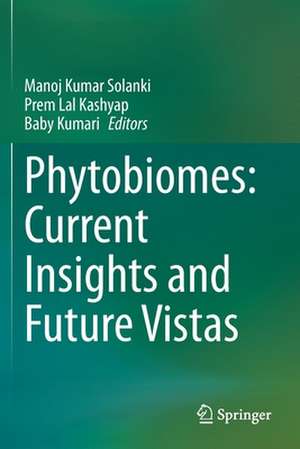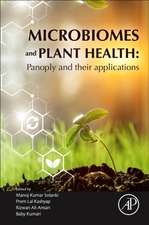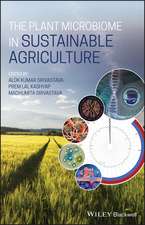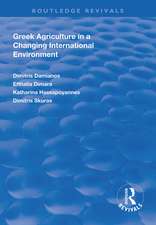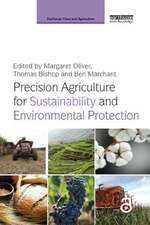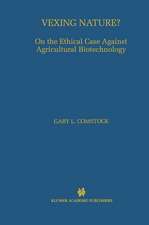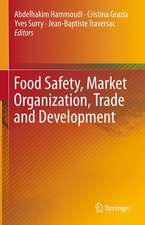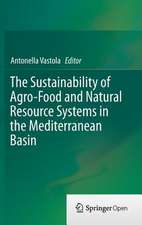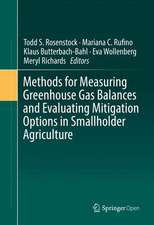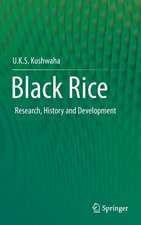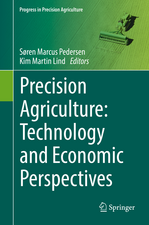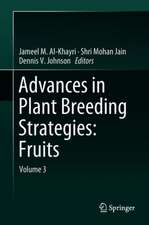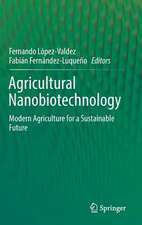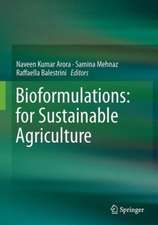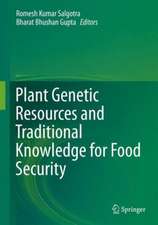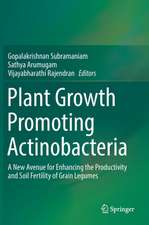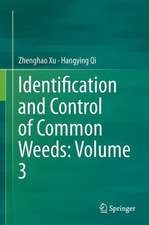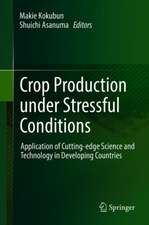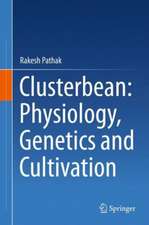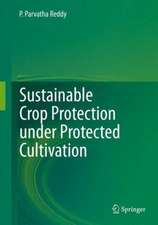Phytobiomes: Current Insights and Future Vistas
Editat de Manoj Kumar Solanki, Prem Lal Kashyap, Baby Kumarien Limba Engleză Paperback – 11 iul 2021
This book presents the updates about the plant associated microbiomesand their contemporary uses. It covers the knowledge gap between soil and plant helper microbiomes and their application in the agriculture and allied sectors. Modern insights of phytobiomes are explored in various chapters on a variety of interrelated aspects of the fascinating areas like plant microbial interaction, integrated pest management, soil fertility intensification, sustainable crop production, and disease management. Sections in the book describe how to plant beneficial microbiomes have been utilized for sustainable green farming, with the aim to resolve the global food problem without harming the soil and environment health. This book is intended for everyone who is involved in agriculture, microbial biotechnology, bioinformatics, and all disciplines related to microbial biotechnology. These include academic students, scientists, and researchers at universities, institutes, industries, and government organizations who want to understand microbial linkages in a shorter time. It contains basic information that will be help to the non-specialist readers to understand progressive research.
| Toate formatele și edițiile | Preț | Express |
|---|---|---|
| Paperback (1) | 950.21 lei 6-8 săpt. | |
| Springer Nature Singapore – 11 iul 2021 | 950.21 lei 6-8 săpt. | |
| Hardback (1) | 956.33 lei 6-8 săpt. | |
| Springer Nature Singapore – 11 iul 2020 | 956.33 lei 6-8 săpt. |
Preț: 950.21 lei
Preț vechi: 1158.79 lei
-18% Nou
Puncte Express: 1425
Preț estimativ în valută:
181.85€ • 187.86$ • 151.34£
181.85€ • 187.86$ • 151.34£
Carte tipărită la comandă
Livrare economică 26 martie-09 aprilie
Preluare comenzi: 021 569.72.76
Specificații
ISBN-13: 9789811531538
ISBN-10: 9811531536
Ilustrații: X, 403 p. 39 illus., 38 illus. in color.
Dimensiuni: 155 x 235 mm
Greutate: 0.58 kg
Ediția:1st ed. 2020
Editura: Springer Nature Singapore
Colecția Springer
Locul publicării:Singapore, Singapore
ISBN-10: 9811531536
Ilustrații: X, 403 p. 39 illus., 38 illus. in color.
Dimensiuni: 155 x 235 mm
Greutate: 0.58 kg
Ediția:1st ed. 2020
Editura: Springer Nature Singapore
Colecția Springer
Locul publicării:Singapore, Singapore
Cuprins
Chapter 1. Phytobiomes: role in nutrient stewardship and soil health.- Chapter 2. Role of a quorum sensing signal, acyl-homoserine lactone in a phytobiome.- Chapter 3. Plant Microbiomes: Understanding the Above Ground Benefits.- Chapter 4. Plant Mycobiome: Current Research and Applications.- Chapter 5. Role of Soil Fauna: en route to Ecosystem Services and its effect on soil health.- Chapter 6. An insight into current trends of pathogen identification in plants.- Chapter 7. Linkages of Microbial Plant Growth Promoters towards the Profitable Farming.- Chapter 8. Wheat microbiome: present status and future perspective.- Chapter 9. Entomopathogenic Fungi: A potential source for biological control of insect pests.- Chapter 10. Role of microbiotic factors against the soil-borne phytopathogens.- Chapter 11. Zinc solubilizing microbes for sustainable crop production: Current understanding, opportunities, and challenges.- Chapter 12. Endophytic phytobiomes as defense elicitors: current insights and future prospectus.- Chapter 13. Role of biotechnology in the exploration of soil and plant microbiomes.- Chapter 14. Plant parasitic nematodes management by phytobiomes and application of fly ash.- Chapter 15. Phytobiome Engineering and its impact on Next Generation Agriculture.-
Notă biografică
Dr. Manoj Kumar Solanki, Ph.D. (Microbiology) is working as a visiting scientist at the Volcani Center, Agricultural Research Organization, Israel. He was awarded a visiting scientist fellowship from the Guangxi Academy of Agriculture Sciences, China, and a senior research fellowship from the Indian Council of Agriculture Research (ICAR), India. He also worked as a Research Associate at the International Crops Research Institute for the Semi-Arid Tropics (ICRISAT), India in a Department of Biotechnology funded project. He has engaged in various research activities on plant-microbe interactions, soil microbiology, plant disease management, and enzymology, and has published several book chapters and research papers in prominent international journals.
Dr. Prem Lal Kashyap, Ph.D. (Plant Pathology) is working at the ICAR-Indian Institute of Wheat and Barley Research (IIWBR), India. His major research areas include wheat pathology, biocontrol, diagnostics, microbial nanotechnology and host–parasite interactions. He has published over 60 research papers in high impact factor journals along with several book chapters, technical bulletins and books. In recognition of his significant achievements in the field of crop protection, he has received several prestigious awards including the NAAS Young Scientist Award, Dr. Basant Ram Young Scientist Award, Prof. Abrar Mustafa Memorial Award, M.K. Patel Memorial Young Scientist Award, and a NAAS Associateship at the national level.
Dr. (Mrs.) Baby Kumari MSc, Ph.D. (Biotechnology) has worked as a researcher (part of her Ph.D. work) at the Bhabha Atomic Research Centre, India. She has engaged in various research activities on plant-microbe interactions, soil microbiology, plant disease management, and nanotechnology, and has published many research papers in prominent international journals. Her research interests include plant-microbiome interactions, especially in medicinal plants, as well as nanoparticle biosynthesis and its application in plant disease management, biosensors, and bioremediation.
Dr. Prem Lal Kashyap, Ph.D. (Plant Pathology) is working at the ICAR-Indian Institute of Wheat and Barley Research (IIWBR), India. His major research areas include wheat pathology, biocontrol, diagnostics, microbial nanotechnology and host–parasite interactions. He has published over 60 research papers in high impact factor journals along with several book chapters, technical bulletins and books. In recognition of his significant achievements in the field of crop protection, he has received several prestigious awards including the NAAS Young Scientist Award, Dr. Basant Ram Young Scientist Award, Prof. Abrar Mustafa Memorial Award, M.K. Patel Memorial Young Scientist Award, and a NAAS Associateship at the national level.
Dr. (Mrs.) Baby Kumari MSc, Ph.D. (Biotechnology) has worked as a researcher (part of her Ph.D. work) at the Bhabha Atomic Research Centre, India. She has engaged in various research activities on plant-microbe interactions, soil microbiology, plant disease management, and nanotechnology, and has published many research papers in prominent international journals. Her research interests include plant-microbiome interactions, especially in medicinal plants, as well as nanoparticle biosynthesis and its application in plant disease management, biosensors, and bioremediation.
Textul de pe ultima copertă
To satisfy the food demands of the global population, advanced technology based research is needed, that can extract the information from the plant metabolism and microbial gene pool and use it for improving plant health and productivity. Modern biotechnological tools have the ability to unlock the limitations of agricultural practices. However, the application of these tools is not well equipped. Moreover, eco-friendly agriculture by microbial inoculants is known to have positive influences on soil/plant health. Therefore it is relevant to explore the plant associated microbial niches, especially endophytes, epiphytes, and soil microbes and understand how they are benefitting each other. It can open new insights to develop sustainable agriculture practices by using consortia of microbes as plant helpers that recover the imbalanced agriculture systems and manage pathogenic diseases.
This book presents the updates about the plant associated microbiomesand their contemporary uses. It covers the knowledge gap between soil and plant helper microbiomes and their application in the agriculture and allied sectors. Modern insights of phytobiomes are explored in various chapters on a variety of interrelated aspects of the fascinating areas like plant microbial interaction, integrated pest management, soil fertility intensification, sustainable crop production, and disease management. Sections in the book describe how to plant beneficial microbiomes have been utilized for sustainable green farming, with the aim to resolve the global food problem without harming the soil and environment health. This book is intended for everyone who is involved in agriculture, microbial biotechnology, bioinformatics, and all disciplines related to microbial biotechnology. These include academic students, scientists, and researchers at universities, institutes, industries, and government organizations who want to understand microbial linkages in a shorter time. It contains basic information that will be help to the non-specialist readers to understand progressive research.
This book presents the updates about the plant associated microbiomesand their contemporary uses. It covers the knowledge gap between soil and plant helper microbiomes and their application in the agriculture and allied sectors. Modern insights of phytobiomes are explored in various chapters on a variety of interrelated aspects of the fascinating areas like plant microbial interaction, integrated pest management, soil fertility intensification, sustainable crop production, and disease management. Sections in the book describe how to plant beneficial microbiomes have been utilized for sustainable green farming, with the aim to resolve the global food problem without harming the soil and environment health. This book is intended for everyone who is involved in agriculture, microbial biotechnology, bioinformatics, and all disciplines related to microbial biotechnology. These include academic students, scientists, and researchers at universities, institutes, industries, and government organizations who want to understand microbial linkages in a shorter time. It contains basic information that will be help to the non-specialist readers to understand progressive research.
Caracteristici
An elaborate account of phytobiomes and their significance towards plant health Explores the microbial connections with plant systems through innovative methods Covers the knowledge gap between soil and plant helper microbiomes and their application in the agriculture and allied sectors
